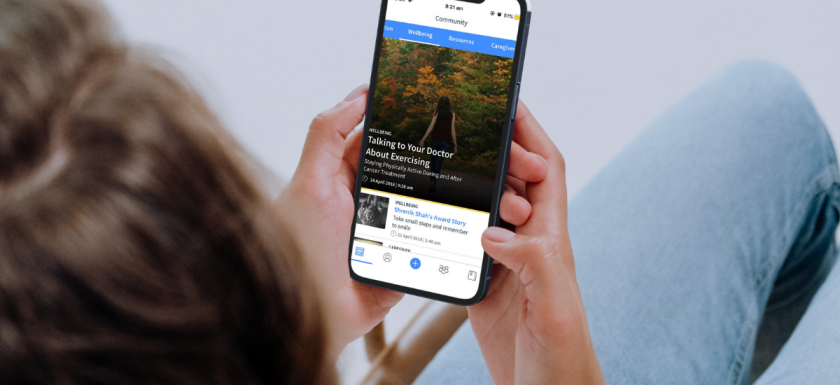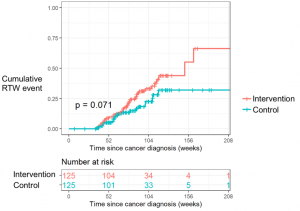
Source: The Authors / Canva
Copyright: The Authors / Canva
URL: https://cancer.jmir.org/2021/4/e31966/
License: Licensed by JMIR
A new report produced by CancerAid, AIA Australia, and Chris O’Brien Lifehouse is the first of its kind globally to showcase how a digitally delivered cancer coaching program supports patients in their return to work
Highlights
● A new study based on a breakthrough digitally delivered coach program, created and managed by CancerAid, has proven to increase cancer patients’ likelihood of returning to work by 73%.
● CancerAid has released a peer-reviewed research report, published by JMIR Cancer, proving the success of the program.
● The report was written and produced by CancerAid, AIA Australia, and Chris O’Brien Lifehouse.
● This study is a global first to demonstrate how a digital health program improves return-to-work outcomes for cancer survivors.
CancerAid (the Company) is pleased to announce JMIR Cancer, a peer-reviewed journal with a focus on innovation and technology, has granted publication of CancerAid’s report: A Digital-Based Coaching Intervention for Cancer Survivors With Job Loss: A Retrospective Analysis; Lo et al; JMIR Cancer 2021: https://pubmed.ncbi.nlm.nih.gov/34710853/
The report focuses on the digitally delivered CancerAid Coach Program and its ability in increasing cancer patients’ likelihood of returning to work. The report was produced and written by CancerAid, AIA Australia, and Chris O’Brien Lifehouse.*
The CancerAid Coach Program provides a range of integrative therapies to help manage symptoms and adverse effects during or after treatment. By focusing on interventions demonstrated to improve patient outcomes, it is predicted that return-to-work (RTW) outcomes will also increase as patients encounter fewer impairments in physical and mental health.
The program consists of an online eHealth app, a series of weekly messages via email and text, and three telephone health coaching sessions delivered over a 12-week period. The program reinforces key health messages on appropriate symptom tracking, exercise, diet, mindfulness, and sleep strategies, and allows patients to monitor their condition.
The study evaluated the impact of a remotely delivered coaching program combined with digital support for patients diagnosed with cancer. It is the first study of its kind to demonstrate that a digital-based support improves return-to-work outcomes for cancer survivors when delivered in a real-world setting.
A total of 220 patients were included in the study and were sourced from AIA’s customer base. Patients with cancer and that were more than 3 months absent from work were provided CancerAid’s Coach Program consisting of digital resources and calls with a health coach. Participants were matched on a 1:1 basis with half undertaking the digital health program compared with participants who did not receive the Coach Program.
The key results were:
● In the matched control group, 17.6% returned to work compared with 30.4% in the Coach Program group, showcasing a 73% increase of likelihood of returning to work for those on the CancerAid course.
● Nineteen matched controls died prior to claim closure compared with 13 in the Coach Program group.
● Cox model estimated median time for the first 15% of the cohorts to RTW was 87.1 weeks for the matched control, compared with 70.6 weeks for those participating in the Coach Program
Patients receiving the remotely delivered coaching program in a real-world setting returned to work at a higher frequency than did control participants receiving usual care.
Furthermore, this study demonstrates that support programs can be effectively implemented as part of routine employment support and remotely delivered outside of the hospital setting.

Approximately 45% of cancer diagnoses occur in people of working age, between 20-64 years old, and it is likely that the prevalence of cancer survivorship in the workforce will continue to increase.
Return-to-work is a key unmet need for working age cancer survivors. The study sought to evaluate RTW outcomes of a multidisciplinary intervention provided as routine employee support. For cancer survivors, RTW can improve their sense of normality, self-respect, and quality of life. From an employer and societal perspective, the RTW of knowledgeable and experienced workers enables continuity of a skilled labor pool.
CancerAid CEO and Cofounder Dr Raghav Murali-Ganesh commented: “We are delighted with the outcome of the study highlighting that a digitally delivered coaching program in a real-world setting for patients diagnosed with cancer improves the likelihood of RTW.”
“Our partners AIA Australia and Chris O’Brian Lifehouse have been fundamental in producing the report and CancerAid is grateful for the time, effort and expertise used to create a successful publication.”
“Employment after a cancer diagnosis is an important social determinant of health and is associated with improved quality of life and the magnitude of the cancer health burden. But work is also a form of rehabilitation in both a physical and a mental sense. It’s really important to keep functioning normally and increase quality of life. We’re not pushing people back to work but having a discussion about the health benefits of returning to good work.”
“As cancer outcomes improve and increase survival rates, so too does the concept of cancer as a chronic disease and so behavioural change becomes important. The goal of the CancerAid program is to empower patients to be more active participants in their own health, in particular on clinically meaningful activities.”
For media enquiries, please contact:
CancerAid
Olivia Fairfield
Marketing Lead
olivia.fairfield@canceraid.com
T+61 414 232 008
About the CancerAid Coach Program
The CancerAid Coach Program provides a range of integrative therapies to help manage symptoms and adverse effects during or after treatment. The CancerAid Coach Program is based upon lifestyle and psychological interventions that are well established and consistent with ASCO guidelines (eg, diet and exercise in survivors of cancer and peer support) or backed by evidence from large, randomized trials to improve patient outcomes (eg, digital symptom tracking). By focusing on interventions demonstrated to improve patient outcomes, it is predicted that return-to-work outcomes will also increase as patients now encounter fewer impairments in physical and mental health.
The CancerAid Coach Program consists of an online eHealth app and three telephone health coaching sessions delivered over a 12-week period. Additionally, a series of weekly messages, via email and text, are sent to participants during the period of the intervention to help reinforce key health messages on appropriate symptom tracking, exercise, diet, mindfulness, and sleep strategies. The CancerAid app allows patients to coordinate their care with tools to read about their condition, treatment options, and a broader community of cancer survivors. It also allows patients to monitor their condition, specifically in relation to being able to track their symptoms digitally and monitor their diet, exercise, sleep, and other patient level data at home via the app.
About CancerAid
CancerAid’s mission is to empower people and organizations affected by cancer to thrive through expertise, empathy, and technology.
CancerAid was founded in 2015 by oncologists looking to empower people to better manage their care and take back control of their diagnosis.
The founding members of the CancerAid team noticed that empowered and supported patients achieved better health outcomes. These experiences helped shape what we offer at CancerAid today: behavioral change and education programs that enable organizations and people affected by cancer to thrive.
About JMIR Cancer
JMIR Cancer (JC) is a PubMed- and ESCI-indexed, peer-reviewed journal with a focus on education, innovation, and technology in cancer care, cancer survivorship, and cancer research, as well as in participatory and patient-centered approaches. This journal also includes research on noninternet approaches to improve cancer care and cancer research.
*Jonathon Lo, Kieran Ballurkar, Simonie Fox Kate Tynan, Nghiep Luu, Michael Boyer, Raghav Murali-Ganesh.
Original article:
Lo J, Ballurkar K, Fox S, Tynan K, Luu N, Boyer M, Murali-Ganesh R. A Digital Coaching Intervention for Cancer Survivors With Job Loss: Retrospective Study. JMIR Cancer 2021;7(4):e31966.
URL: https://cancer.jmir.org/2021/4/e31966
doi: 10.2196/31966
PMID: 34710853
